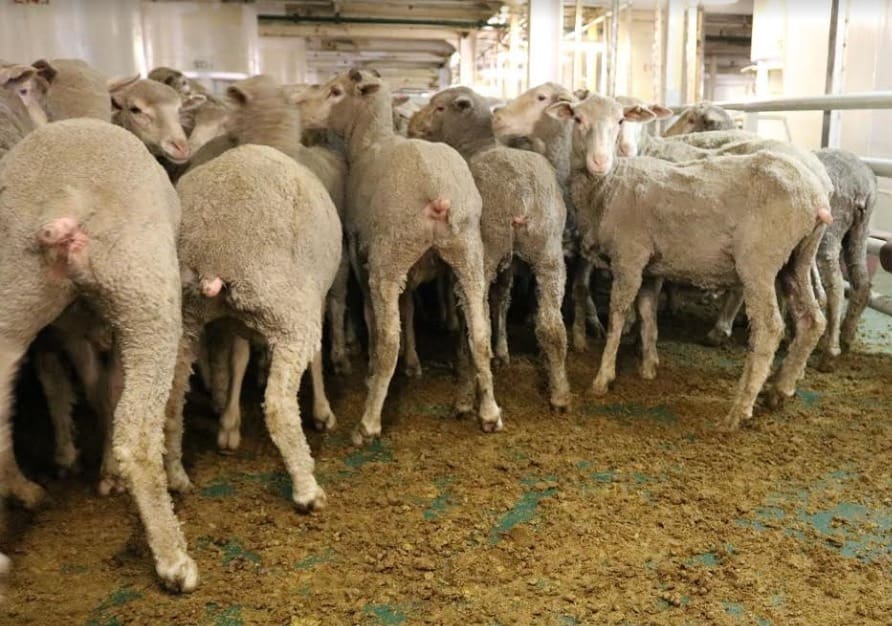
Sheep on board the Al Messilah.
EARLY analysis of draft heat risk assessment recommendations for Middle East live sheep shipments suggest they would threaten the viability of the trade during peak demand months.
The recommendations of an independent Heat Stress Risk Assessment Technical Reference Panel that would limit Middle East sheep shipments to conditions meeting strict air temperature criteria have exporters doubting the viability of the trade for upto 9-11 months of the year.
Animal Australia chief executive officer Glenys Oogjes said the recommendations the panel released in a draft report today would see a regulatory cessation of shipments to the Middle East between May and October, with substantial restrictions in other months.
Ms Oogjes said Animals Australia welcomed the outcome of the Heat Stress Risk Assessment review.
“This report confirms what live exporters have known for decades, that shipping Australian sheep across the high heat months in the Middle East results in egregious suffering.
“This scientific review is set to have significant implications for the industry,” she said.
“It’s time for the Morrison Government to sit down with sheep producers and progress a transition plan away from live sheep export.”
An RSPCA statement said the recommendation to shift the HSRA model from one based on animal mortality to one based on animal welfare will have significant consequences for the trade’s viability with the likely cessation of the May to October summer trade.
“The RSPCA has long maintained that if the live sheep trade was forced to reconcile its practices with basic animal welfare standards, it would no longer be viable.
“This report is another significant step towards the live sheep trade’s inevitable end,” the RSPCA said.
“There is no future in live sheep export – sheep producers and farming groups must act now to prepare for business beyond this cruel trade, rather than fighting against the inevitable.
“The RSPCA continues to urge the government to face up to this reality and assist producers with an ordered phase-out of the trade.”
DAWR’s own analysis points to trade decline
A Department of Agriculture and Water Resources briefing paper released today also stated: “It may not be economic to export sheep to the Middle East during the northern summer, leading to a cessation of trade during this period.”
The HSRA panel has recommended that wet bulb temperature be used as a measure of a ship’s thermal environment to set a heat stress threshold for sheep. It has suggested a WBT welfare limit for a standardised shipper sheep (56 kg adult Merino wether, body condition score 3, zone 3, winter acclimatised, recently shorn) is 28°Celsius.
The panel’s report also recommended that there be a 98 percent probability that the deck temperatures the sheep would be exposed to during a planned voyage would remain below the WBT welfare limit.
The DAWR briefing paper said that a comparison with analysis undertaken during the McCarthy review suggests live Merino sheep exports from Australia during the hottest months of the year in the northern hemisphere (May to October) may not meet the WBT animal welfare criterion.
“It is also likely that decks on ships will carry reduced numbers of sheep during other months of the year, depending on the effectiveness of shipboard ventilation and the class of sheep to be exported.
“It may not be economic to export sheep to the Middle East during the northern summer, leading to a cessation of trade during this period,” the briefing paper said.
“Depending on the effectiveness of shipboard ventilation and the class of sheep to be exported, the recommended changes to the model could result in a reduced number of sheep on voyages during other months of the year (outside the northern hemisphere summer months).”
The DAWR paper said that although the impact on the broader industry over the course of a year remains to be determined, it will be dependent on the class of sheep available for export and the effectiveness of shipboard ventilation, including pen air turnover rates.
“It is likely that the numbers of sheep exported will decline and the trade will become more seasonal than it has been in the past.
“The bulk of sheep exports to the Middle East may take place between November and April,” the paper said.
Could lighter, more heat tolerant sheep be an option?
The DAWR briefing paper also said it is apparent that lighter, heat tolerant sheep breeds have a higher heat stress threshold and may be able to be exported for more months of the year.
“This could mean an increase in demand for these types of sheep by exporters.
“This may, in turn, predicate a move by some farmers towards producing these types of sheep, depending on relative prices of wool, meat and live export sheep,” the department said.
“The change in trading patterns for live sheep will also impact on incomes for shipowners, exporters, agents, livestock land transporters, operators of registered premises, stockfeed manufacturers, stevedores, AAVs and stockpersons and others involved in the livestock export chain.
“A change towards a risk assessment based on animal welfare might provide a competitive advantage to those in the export chain who exercise appropriate management and care of livestock,” DAWR said.
“For example, exporters using the best engineering solutions to provide ventilated ships, or farmers breeding classes of sheep with a higher tolerance for hot conditions, might represent the future of the live animal trade.”
Click here to read the DAWR assessment of the new HSRA recommendations’ impacts.
Submissions to the draft report will be analysed by the panel in finalising its report and recommendations to the department. The aim is for new HSRA settings to be implemented in 2019—before the next northern hemisphere summer. Stakeholders can get more information and provide their feedback to the draft report via the ‘Have Your Say’ platform at haveyoursay.agriculture.gov.au/hsra-review. Submissions to the panel will close 31 January 2019.

HAVE YOUR SAY